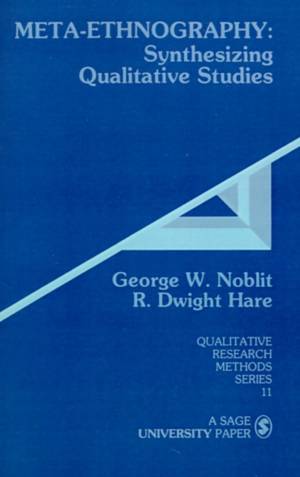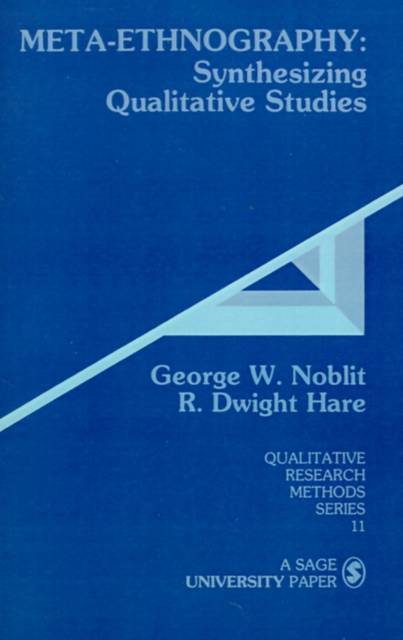
- Afhalen na 1 uur in een winkel met voorraad
- Gratis thuislevering in België vanaf € 30
- Ruim aanbod met 7 miljoen producten
- Afhalen na 1 uur in een winkel met voorraad
- Gratis thuislevering in België vanaf € 30
- Ruim aanbod met 7 miljoen producten
Zoeken
€ 160,45
+ 320 punten
Uitvoering
Omschrijving
How can ethnographic studies be generalized, in contrast to concentrating on the individual case? Noblit and Hare propose a new method for synthesizing from qualitative studies: meta-ethnography. After citing the criteria to be used in comparing qualitative research projects, the authors define the ways these can then be aggregated to create more cogent syntheses of research. Using examples from numerous studies ranging from ethnographic work in educational settings to the Mead-Freeman controversy over Samoan youth, Meta-Ethnography offers useful procedural advice from both comparative and cumulative analyses of qualitative data. This provocative volume will be read with interest by researchers and students in qualitative research methods, ethnography, education, sociology, and anthropology. "After defining metaphor and synthesis, these authors provide a step-by-step program that will allow the researcher to show similarity (reciprocal translation), difference (refutation), or similarity at a higher level (lines or argument synthesis) among sample studies....Contain(s) valuable strategies at a seldom-used level of analysis." --Contemporary Sociology "The authors made an important contribution by reframing how we think of ethnography comparison in a way that is compatible with the new developments in interpretive ethnography. Meta-Ethnography is well worth consulting for the problem definition it offers." --The Journal of Nervous and Mental Disease "This book had to be written and I am pleased it was. Someone needed to break the ice and offer a strategy for summarizing multiple ethnographic studies. Noblit and Hare have done a commendable job of giving the research community one approach for doing so. Further, no one else can now venture into this area of synthesizing qualitative studies without making references to and positioning themselves vis-a-vis this volume." -Educational Studies
Specificaties
Betrokkenen
- Auteur(s):
- Uitgeverij:
Inhoud
- Aantal bladzijden:
- 88
- Taal:
- Engels
- Reeks:
- Reeksnummer:
- nr. 11
Eigenschappen
- Productcode (EAN):
- 9780803930223
- Verschijningsdatum:
- 1/01/1988
- Uitvoering:
- Hardcover
- Formaat:
- Genaaid
- Afmetingen:
- 169 mm x 226 mm
- Gewicht:
- 308 g

Alleen bij Standaard Boekhandel
+ 320 punten op je klantenkaart van Standaard Boekhandel
Beoordelingen
We publiceren alleen reviews die voldoen aan de voorwaarden voor reviews. Bekijk onze voorwaarden voor reviews.











